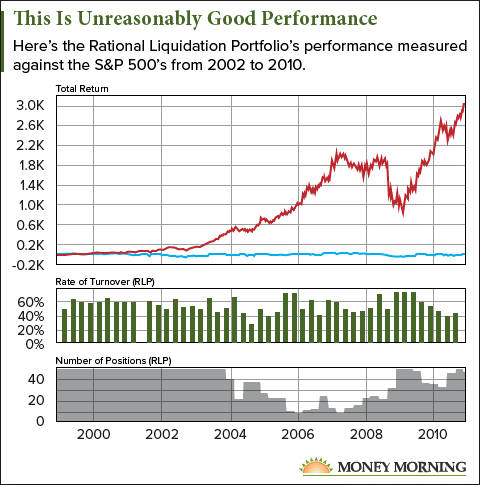I am 56 years old. I've lived through some of the most challenging market conditions of all time: two crashes, a recession, a recession so bad it might as well have been a depression, two open-ended wars, and almost a decade of the "cheapest" monetary policy in recorded history.
So, to be blunt, I don't have 30 years to wait around for the indexes to catch up after a period of underperformance.
It's just not an option. I refuse to "go quietly into that good night" of lower returns and diminished expectations.
I have no choice but to find ways to earn high returns - no matter what the S&P 500 does over the next several years.
And I mention this... because you're probably in the same boat as me. We have to go out and grab unreasonably high returns to get the retirements we want and deserve.
I'm going to show you one of my favorite ways to do that, and Wall Street will never see us coming...
This Made "Larry the Liquidator" and Gordon Gekko a Ton of Money - and It Works in Real Life
Last week, I showed you a strategy I love to use to earn average annual returns of 13.7%... against the 0.18% you'd get from an indexing strategy.
Now I'm going to show you a way to grab even bigger "unreasonably good" average returns... using something I call the "Larry the Liquidator" approach to making money.

We probably all remember Oliver Stone's classic "Wall Street," with Michael Douglas' star turn as Gordon Gekko - a classic, fabulously wealthy "corporate raider"-type who tries to swoop in and break up "Bluestar Airlines."
"Wall Street" was great, but I liked the 1991 movie "Other People's Money," starring Danny DeVito as corporate raider Lawrence "Larry the Liquidator" Garfield, even better.
I'll tell you why...
There's a scene where Larry stands in front of a chalkboard and shows the value of a company he's about to take over and rip apart, the fictional "New England Wire & Cable."
The Night Trader's Secret: A former Wall Street insider just revealed a new strategy for executing night trades that could set you up for potential $850, $2,250, or $6,775 paydays – overnight. Click here.
The upshot of DeVito's scene here is that the value of "New England Wire & Cable" is higher if you broke up and sold off parts of the business and pocketed the cash. In the movie, Larry stands to just about double his money taking that approach to his target.
We can do the exact same thing, using a variation of Larry the Liquidator's own equation that I call "Rational Liquidation Value."
[mmpazkzone name="in-story" network="9794" site="307044" id="137008" type="4"]
Don't worry - I won't scare anyone with the equation. I've done the math here so you won't have to. But let me show you the kind of unreasonably high returns this can get you...
Let's Do a Little Corporate Raiding of Our Own
There are lots of companies that trade for less than liquidation value, but most of them are garbage.
As you might remember, I like quality in companies I own. I don't want to own anything less, because entrenched management is going to run that business right into the ground so they can keep collecting salaries and benefits right up until the corporate funeral.
I want to own companies where the business is in good shape and getting better. I want the companies in my "Rational Liquidation Portfolio" to have decent credit ratings with little risk of bankruptcy or financial failure.
Constant pruning is required. You have to stay on top of the companies you own and be relatively cold-blooded about selling those where conditions are not continually improving.
You Have to See It to Believe It: The Night Trader's most powerful tool tells him exactly which stocks are set to go up tomorrow, the next day, the day after that, and beyond. And it is rarely ever wrong. Click here to learn more...
But you'll be rewarded by those companies that stay in the portfolio; they'll give you unreasonably high long-term returns.
From the start of 1999 until the close of 2010, this strategy returned an average of 33.37% annually.
Have a look...

With this approach, the higher returns came with less risk than owning an index fund.
Make no mistake: This is a case of a bad market being your best friend as an investor.
The two enormous market collapses may have crushed those that embraced indexing and Wall Street's carefully packaged mediocrity, but it provided Rational Liquidation Value investors uncommon opportunities to buy solid companies below their liquidation value.
When the economy and markets improved, these companies saw their stock price rebound in spectacular fashion. It doesn't work in spite of a bear market; this approach works because of a bear market.
Best of all, none of this information is top secret - it's just that the herd doesn't care about it.
These companies publish this data all the time, and it's there for the taking. It's not easy to do the calculations needed to determine which companies belong in your Rational Liquidation Portfolio, but it is possible.
But, here's the thing...
In a few weeks, I'm launching a service where I'll scout these, and a couple of other "unreasonably" profitable opportunities, for you, so you can build a Rational Liquidation Portfolio of your own. That way you won't be stuck like the Wall Street herd, waiting around for the markets to catch up.
You'll hear more as we get closer to the launch date - it's coming soon - and you'll have the opportunity to join, too.
The Night Trader Has Arrived… It's taken us eight months of negotiations... and now, the moment has finally arrived. A former CEO and Wall Street insider revealed his coveted Night Trading strategy – a new mechanism for executing trades that set you up for potential $850… or $2,250… or $6,775 paydays – OVERNIGHT. Go here for details.
Follow Money Morning on Facebook, Twitter, and LinkedIn.
About the Author
Tim Melvin is an unlikely investment expert by any measure. Raised in the "projects" of Baltimore by a single mother, he never attended college and started out as a door-to-door vacuum salesman. But he knew the real money was in the stock market, so he set sights on investing - and by sheer force of determination, he eventually became a financial advisor to millionaires. Today, after 30 years of managing money for some of the wealthiest people in the world, he draws on his experience to help investors find "unreasonably good" bargain stocks, multiply profits, and build their nest eggs. Tim tirelessly works to find overlooked "hidden gems" in the stock market, drawing on the research of legendary investors like Benjamin Graham, Walter Schloss, and Marty Whitman. He has written and lectured extensively on the markets, with work appearing on Benzinga, Real Money, Daily Speculations, and more. He has published several books in the "Little Book of" Investment Series and a "Junior Chamber Course" geared towards young adults that teaches Graham's principles and techniques to a new generation of investors. Today, he serves as the Special Situations Strategist at Money Morning and the editor of Peak Yield Investor.



